May 18, 2025 | 16:43 GMT +7
May 18, 2025 | 16:43 GMT +7
Hotline: 0913.378.918
May 18, 2025 | 16:43 GMT +7
Hotline: 0913.378.918
Prof. Vo Tong Xuan, Honorary Rector of Nam Can Tho University, who was then a lecturer at the Agriculture College's Faculty of Biological Agriculture, led a group of teachers and lecturers in conducting the journey beginning in 1972. The countrywide project for collecting, archiving, and preserving rice seeds aims to accumulate and breed optimal rice varieties.
Can Tho University's Agriculture Department has a rice seed bank. From just a few seeds, in the beginning, the bank now boasts over 3,000 kinds, gathering all types of rice on the largest scale in the Mekong Delta, from seasonal rice, and upland rice to high-yielding rice.
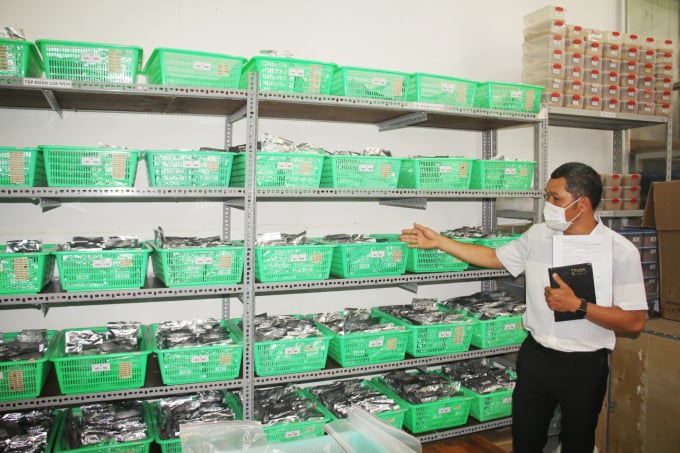
Seed bank stores more than 3,000 varieties of seeds at the Faculty of Agriculture, Can Tho University. Photo: Kim Anh.
The bank has maintained over 900 seasonal and traditional rice types from the southern people, including Nang Thom Cho Dao, Than sticky rice, Do sticky rice, Bong Dua rice collected in 1994, Tai Nguyen rice collected in 1997, and Chau Hang Vo rice collected in 2000...
Over the last 50 years, over 940 advanced rice varieties have been produced and sent to seed centers in the Mekong Delta region for pilot planting and management. Following in the footsteps of the previous generation, Lecturer Huynh Nhu Dien of the Department of Genetics and Plant Breeding at the Faculty of Agriculture continues to manage the seed bank's preservation.
According to Mr. Dien, farmers previously planted traditional rice varietals. However, because of the short-term nature of the crop and the demand for food security, farmers are forced to modify and expand the crop, resulting in the development of a new variety structure. The introduction of new rice varieties has resulted in the destruction of traditional rice varieties. Speaking about the opportunity that the seed bank has created, maintained, and kept thus far, Mr. Dien stated that as agricultural production is restructured, prior rice varieties would no longer be employed and will disappear if not saved.
From this point of view, teachers and lecturers have decided to acquire rice varieties. Additionally, seasonal rice varieties themselves have favorable characteristics, such as a long growing period and the ability to be farmed just once a year. When seasonal rice varieties are preserved, they provide a valuable resource for breeding, resulting in the development of several new rice varieties with superior short-term traits while retaining the benefits of fragrant, flexible kinds.
Due to the high demand for seeds for research and cross-breeding, the bank is separated into two distinct storage areas: long-term and short-term. Mid-term storage runs at a seed storage temperature of less than -5 degrees Celsius; rice varieties will be stored continuously here for a period of more than ten years.
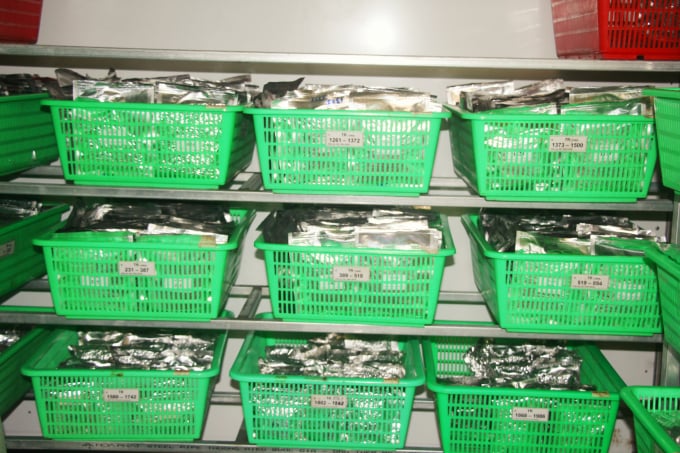
Rice varieties are preserved in medium-term storage warehouses, with a storage capacity of more than 10 years. Photo: Kim Anh.
Short-term storage is used to keep seeds at a temperature of around 20 degrees Celsius for a period of two to five years, allowing for continuous cross-breeding. To guarantee that the seeds are not destroyed throughout the drying process, vacuum pressing, and finally storing, all seeds must undergo a rigorous drying process, vacuum pressing, and storage.
Dr. Huynh Ky, Deputy Head of the Department of Genetics and Plant Breeding at the Faculty of Agriculture, said that rice varieties in the seed bank lose their germination after 5-7 years and must be rejuvenated to survive. Thus, each year, rice varieties will be rejuvenated and cleansed to ensure that seeds preserve their germination power. This task requires a significant investment of time, money, and labor.
Additionally, the Department is now keeping a collection of upland rice varieties in the Central Highlands and Northwest. The advantage of these rice types is that they are hillside-grown, which means they are drought-tolerant and save water.
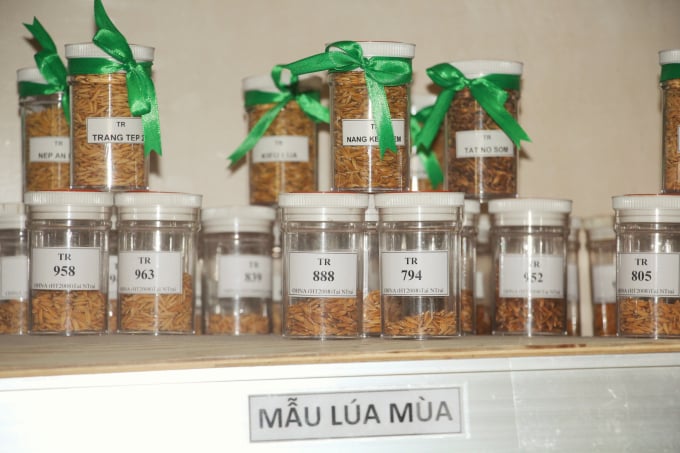
Samples of rice varieties are stored in short-term storage warehouses, serving research work throughout the year. Photo: Kim Anh.
Mr. Huynh Nhu Dien continued, "The Department will design and study varieties suited for the land in Binh Tan, Vinh Long province in order to assist people in transforming the agricultural structure." Or, in locations with water scarcity, this rice variety may be grown to hold water and endure drought.
In keeping with the market's growth trend, the Faculty of Agriculture has introduced various high-quality rice varieties. Through this diverse seed bank, the Faculty of Agriculture is collaborating with companies to continue studying and creating new rice varieties. Additionally, the unit will experiment with and transfer promising rice varieties.
According to Prof Vo Tong Xuan, each country has a program in place to conserve all of its traditional rice types. Meanwhile, in Vietnam, gathering and storing rice varieties were difficult in the past owing to harsh wars.
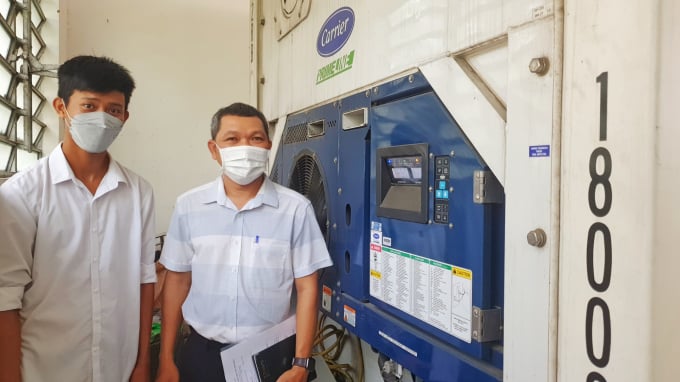
Mr. Huynh Ky, Deputy Head of the Department of Genetics and Plant Breeding, is one of the members directly involved in the conservation of rice varieties of the Faculty of Agriculture. Photo: Kim Anh.
"At the time, a group from Taiwan's Department of Agricultural Development visited the south to collaborate with the Tien Giang Agricultural Center (now the Southern Fruit Institute). They sought to collect rice varieties indigenous to the Southern area and bring them to their nation in order to plant and assess the varieties' efficacy.
However, because the South had only approximately 40 - 50 varieties of rice at the time, most of which were seasonal, I discovered that amount was insufficient, and the idea of collecting seed samples of rice varieties began to shape "Prof. Vo Tong Xuan said.

General Vo Nguyen Giap visits Can Tho University's rice seed bank in 1977. People sitting (from left to right): Prof. Vo Tong Xuan, Rector Pham Son Khai, General Vo Nguyen Giap. Photo: Professor Vo Tong Xuan.
Professor Vo Tong Xuan said, "In 1977, General Vo Nguyen Giap visited the Can Tho University Seed Bank and expressed his admiration for the gathering of rice seeds; he was delighted and determined to sustain the bank."
To preserve all information on rice varieties, the Prof and other lecturers prepared a catalog that includes the varieties' names, collection dates, and collection places... all according to the IRRI International Rice Institute's criteria. When he established a seed bank, he enlisted the assistance of individuals with a strong passion for varieties to jointly store and conserve kinds.
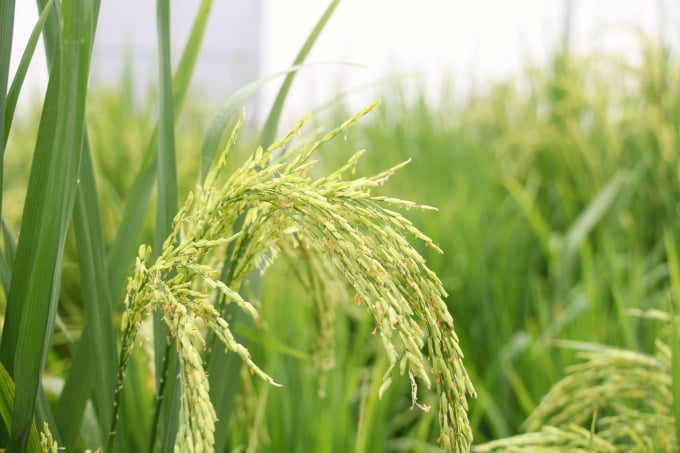
Rice varieties are currently being bred from conservation seed sources, serving the development of high-quality rice varieties. Photo: Kim Anh.
"After 1975, Can Tho University lacked sufficient infrastructure to sustain the seed bank. With such a big quantity of seeds, planting rice varieties each year is extremely difficult, and seed purity cannot be assured.
With the assistance of a number of international scientific organizations, the seed bank was able to secure a frozen storage facility at a temperature of -5 degrees Celsius to preserve the rice varieties. Now that the archive has greater financing, it is also frequently invested in, repaired, upgraded, and improved."
Prof. Tong Xuan Vo
Translated by Linh Linh

(VAN) Deputy Minister Nguyen Quoc Tri also expressed his hope that Cuba will soon overcome its current challenges, attain food security, and further expand cooperation with Vietnam.

(VAN) The project contributes to enhancing the resilience of communities vulnerable to the impacts of climate change, with a primary focus on local women.
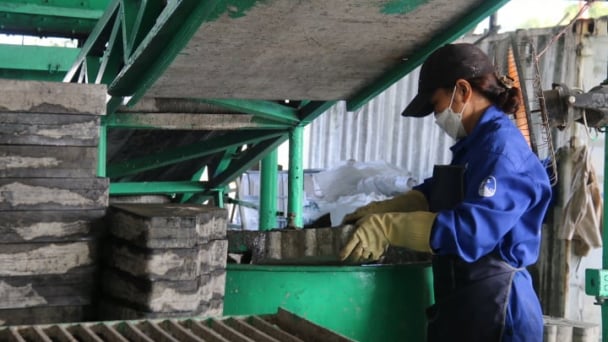
(VAN) Green materials help save energy and resources. However, after more than 10 years, Vietnam has only developed over 200 green buildings with more than 6 million square meters of floor space.

(VAN) Vietnam - Thailand Business Forum 2025: One plus one on three connects, marking a milestone in the comprehensive strategic partnership between the two nations.
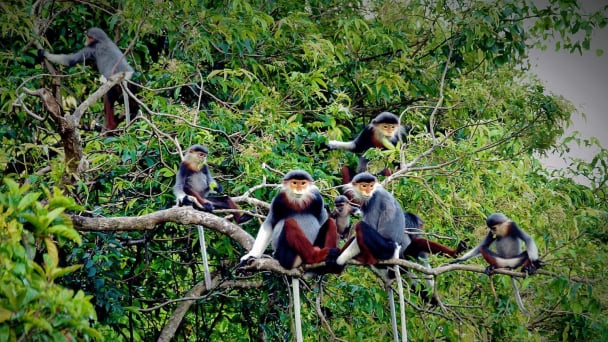
(VAN) The United Nations designated 22 May as the International Day for Biodiversity 2025 with the theme 'Harmony with nature and sustainable development.'
![Multi-channel, multi-directional Vietnamese agricultural markets: [8] A national strategy is needed](https://t.ex-cdn.com/nongnghiepmoitruong.vn/608w/files/phucpm/2025/05/15/1435-thi-truong-nong-san-viet-da-kenh-da-huongbai-8-can-mot-chien-luoc-quoc-gia-084750_728.jpg)
(VAN) The Chairman of Hung Nhon Group shared: ‘Opening up and tapping into new markets is the right and strategic direction for Vietnam's agricultural sector.’
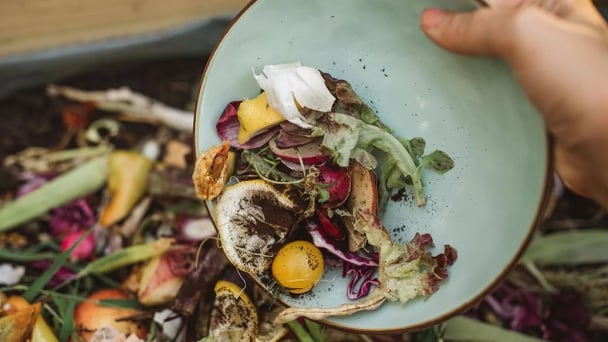
(VAN) Food waste has become a serious issue in modern society, especially in rapidly urbanizing and developing cities like Hanoi.